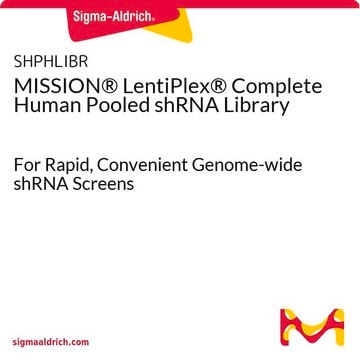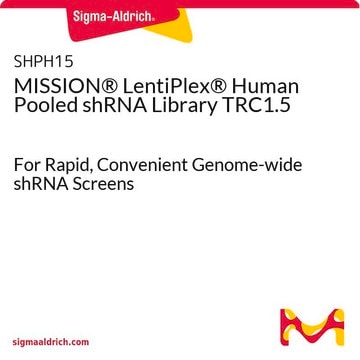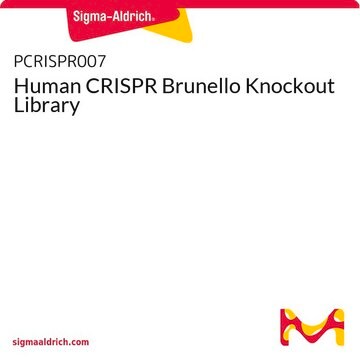おすすめの製品
品質水準
製品種目
MISSION®
濃度
≥5x108 VP/ml (via p24 assay)
テクニック
capture ELISA: 5 x 108 TU/mL using p24
輸送温度
dry ice
保管温度
−70°C
詳細
MISSION LentiPlex Pooled Libraries bring the power of the MISSION TRC shRNA collection together with Sigma′s lentiviral manufacturing expertise to enable genome-wide RNAi screens at your bench-top. The LentiPlex pooled system provides enhanced delivery and long-term gene silencing in non-dividing and primary cell lines allowing unlimited discovery potential. The convenient format now makes rapid whole-genome RNAi screens accessible to any researcher with minimal reagent, time or capital equipment investment.
The MISSION LentiPlex Human shRNA Pooled Library 2.0 includes additional gene and clone coverage from the previously offered LentiPlex 1.0 Pooled Library . With the addition of 2.0, which consists of 5,000+ human genes and 20,000+ total clone coverage divided into 3 subpools, the complete whole-genome human library complete whole-genome human librarynow consists of over 125,000 shRNA constructs from the TRC collection targeting 20,000+ human genes. Each library is tested for shRNA representation before product release to ensure robust library coverage. The complete library is provided in ready-to-use lentiviral format at titers of at least 5 x 108 TU/ml via p24 assay and is pre-divided into sixteen subpools of approximately 6,000-8,000 shRNA constructs each. Amplification and sequencing primers are also provided for downstream target identification.
For more information including sample data and uses, please visit our LentiPlex Technical Detail Page.
The MISSION LentiPlex Human shRNA Pooled Library 2.0 includes additional gene and clone coverage from the previously offered LentiPlex 1.0 Pooled Library . With the addition of 2.0, which consists of 5,000+ human genes and 20,000+ total clone coverage divided into 3 subpools, the complete whole-genome human library complete whole-genome human librarynow consists of over 125,000 shRNA constructs from the TRC collection targeting 20,000+ human genes. Each library is tested for shRNA representation before product release to ensure robust library coverage. The complete library is provided in ready-to-use lentiviral format at titers of at least 5 x 108 TU/ml via p24 assay and is pre-divided into sixteen subpools of approximately 6,000-8,000 shRNA constructs each. Amplification and sequencing primers are also provided for downstream target identification.
For more information including sample data and uses, please visit our LentiPlex Technical Detail Page.
その他情報
The MISSION LentiPlex Human Pooled shRNA Libraries consist of Catalog Numbers SHPH01, SHPH15, SHPH2, and SHPHLIBR. Please refer to Table 1 for approximate number of shRNA clone coverage, targeted genes, and subpools for each library.
Amplification and sequencing primers are also provided for downstream hit identification.
Deconvolution of shRNA Pools
Sigma′s deconvolution service lets you easily identify the genes that impact your pooled shRNA screen.
Contact your local Sigma sales representative for more information or submit an inquiry to MISSION RNAi
Amplification and sequencing primers are also provided for downstream hit identification.
Deconvolution of shRNA Pools
Sigma′s deconvolution service lets you easily identify the genes that impact your pooled shRNA screen.
- Next-generation sequencing of clonesgives a precise number of individual clone occurrence within a pooled shRNA sample
- Comprehensive, reproducible results from pooled shRNA screens
- Statistically robust and information-rich data
Contact your local Sigma sales representative for more information or submit an inquiry to MISSION RNAi
おすすめ製品
Browse additional MISSION shRNA Gene Family Sets in our MISSION shRNA portal
法的情報
LentiPlex is a registered trademark of Merck KGaA, Darmstadt, Germany
MISSION is a registered trademark of Merck KGaA, Darmstadt, Germany
保管分類コード
12 - Non Combustible Liquids
WGK
WGK 3
引火点(°F)
Not applicable
引火点(℃)
Not applicable
適用法令
試験研究用途を考慮した関連法令を主に挙げております。化学物質以外については、一部の情報のみ提供しています。 製品を安全かつ合法的に使用することは、使用者の義務です。最新情報により修正される場合があります。WEBの反映には時間を要することがあるため、適宜SDSをご参照ください。
カルタヘナ法
カルタヘナ法
Jan Code
SHPH2-1SET:
最新バージョンのいずれかを選択してください:
Christine Karlsson et al.
Methods in molecular biology (Clifton, N.J.), 650, 29-43 (2010-08-06)
Identifying the genes and pathways that regulate self-renewal and differentiation in somatic stem cells is a central goal in stem cell and cancer biology. Here, we describe a method for RNAi-based screens in primary human hematopoietic stem and progenitor cells.
Functional dissection of lysine deacetylases reveals that HDAC1 and p300 regulate AMPK.
Lin, Yu-yi, et al.
Nature (2012)
Richard Possemato et al.
Nature, 476(7360), 346-350 (2011-07-16)
Cancer cells adapt their metabolic processes to drive macromolecular biosynthesis for rapid cell growth and proliferation. RNA interference (RNAi)-based loss-of-function screening has proven powerful for the identification of new and interesting cancer targets, and recent studies have used this technology
資料
RNAi Consortium (TRC): Collaborative effort among academic labs and biotech/pharma institutes advancing RNA interference research.
関連コンテンツ
創薬ターゲットとリードの特定に向けた確実なスクリーニングには、試験を経てプロセスに適合したハイスループット対応の試薬と機器が必要です。CRO、製薬企業またはバイオ企業における低分子および生物製剤のスクリーニングプロセス、ならびに治療安全性のための厳格な免疫原性試験に適したツールを選びましょう。
High-throughput reagents for drug target screening and immunogenicity testing.
ライフサイエンス、有機合成、材料科学、クロマトグラフィー、分析など、あらゆる分野の研究に経験のあるメンバーがおります。.
製品に関するお問い合わせはこちら(テクニカルサービス)








